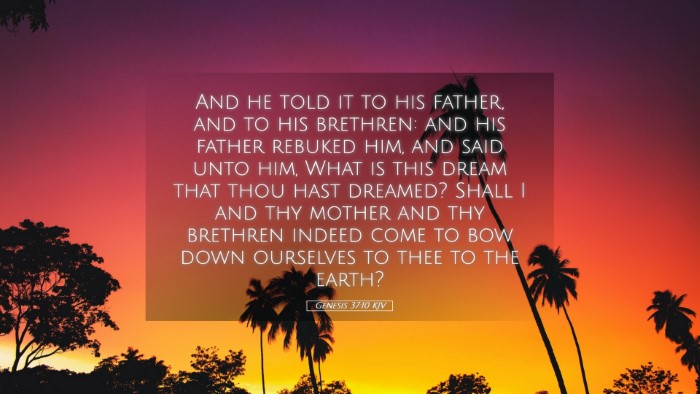Commentary on Genesis 37:10
Bible Verse: "And he told it to his father, and to his brethren: and his father rebuked him, and said unto him, What is this dream that thou hast dreamed?" (Genesis 37:10, KJV)
Introduction
This verse represents a crucial moment in the narrative of Joseph's life. It sets the stage for the ensuing conflict among his family members, particularly in relation to Joseph's prophetic dreams.
The verse showcases not only the familial dynamics at play but also highlights the theological implications regarding God's sovereignty and providence in human affairs.
Insights from Matthew Henry
Matthew Henry emphasizes that Joseph's dream signifies his eventual exaltation and the submission of his family to him.
He notes that Joseph's brothers were already predisposed to resentment and jealousy, which was further inflamed by the revelation of his dreams.
Henry illuminates the emotional and moral complexities in Joseph's family dynamics, pointing out that while Joseph acts innocently by sharing his dreams, his father's rebuke indicates a protective instinct over his family.
- Dreams as Divine Revelation: The dreams are seen as revelations from God that indicate His plans for Joseph's future, serving as an assurance of God's real-time guidance.
- Familial Tension: The rebuke from Jacob also signifies a human tendency to reject uncomfortable truths, as it foreshadows the eventual trials that Joseph will face.
Insights from Albert Barnes
Albert Barnes interprets this dream as a harbinger of Joseph's future authority over his brothers.
He suggests that the act of sharing the dream with his family was not mere boasting but an instinctive relay of a significant event.
Barnes points out that Jacob's response highlights the disbelief often encountered in the face of divine revelation.
He reflects on the spiritual lesson that sometimes God's plans can offend human sensibilities, prompting an adverse reaction.
- Jacob’s Role: Jacob's rebuke is notable; as both a father and a patriarch, he understands the weight of prophetic messages.
- Expectation of Authority: The dream itself is a direct conflict to the established order within the family, adding layers of complexity to Joseph’s later struggles.
Insights from Adam Clarke
Adam Clarke provides a detailed exegesis on the social and theological implications of Joseph’s dreams.
He elucidates that sharing the dreams with his family could indicate Joseph's naiveté concerning their possible feelings of envy and animosity.
Clarke also notes that Jacob’s reaction is significant; it shows the difficulty of accepting God’s broader plans, especially when they contradict immediate family expectations.
- Spiritual Blindness: Clarke emphasizes the theme of spiritual blindness, where familial loyalty may cloud one's vision of divine purpose.
- Symbolism of Dreams: The dreams reflect not only Joseph’s future but also the larger narrative of Israel and God’s covenantal work through His chosen people.
Theological Reflections
Genesis 37:10 invites deeper theological reflection on themes such as jealousy, prophecy, and divine sovereignty.
Joseph's narrative represents a face of God’s larger redemptive plan, as God uses familial conflict and human decisions to fulfill His purposes.
The rebuke from Jacob serves as a reminder of the tension that often exists between divine revelation and personal expectations.
- Divine Providence: This passage underscores the providence of God, as it foreshadows events that God will orchestrate in Joseph's life, despite human opposition.
- Role of Dreams: The significant role of dreams in biblical narrative raises questions about how God communicates His will and how humans respond to such communication.
- Conflict and Resolution: The family conflict initiated by Joseph's dreams leads to a series of transformative events—both for Joseph and for his brothers—as they ultimately confront their own shortcomings.
Conclusion
The commentary on Genesis 37:10 highlights the intricate dynamics within Joseph's family, providing critical insights into themes of prophecy, familial relationships, and divine purpose.
As pastors, students, and theologians reflect on this text, it serves as a compelling reminder of how God’s plans can often incite conflict, elicit a range of emotions, and yet ultimately lead to profound reconciliation and God's redemptive work in the world.


